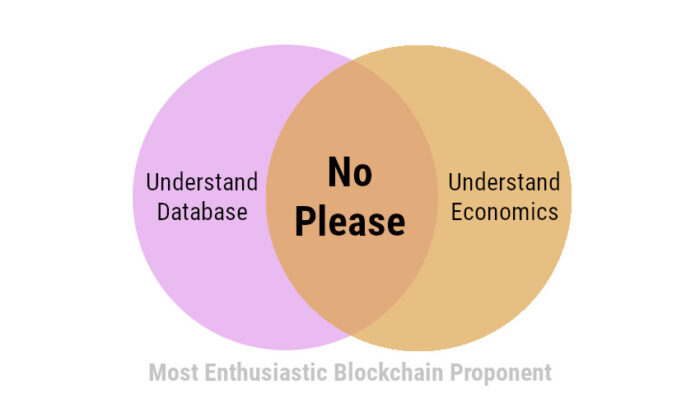พยายามหาคำอธิบายปรากฏการณ์ของกระแสบล็อคเชนช่วงปี 2020/2021 มานานพอสมควร มาเจอบล็อกเก่าปี 2018 ที่เพิ่งเคยอ่าน (via jwz) และพบว่าเป็นคำอธิบายที่ดีมาก
Bitcoin and blockchains lash together an unusual distributed database with a libertarian economic model.
- People who understand databases realize that blockchains only work as long as there are incentives to keep a sufficient number of non-colluding miners active, preventing collusion is probably impossible, and that scaling blockchains up to handle an interesting transaction rate is very hard, but that no-government money is really interesting.
- People who understand economics and particularly economic history understand why central banks manage their currencies, thin markets like the ones for cryptocurrencies are easy to corrupt, and a payment system needs a way to undo bogus payments, but that free permanent database ledger is really interesting.
Not surprisingly, the most enthusiastic bitcoin and blockchain proponents are the ones who understand neither databases nor economics.
นิยามข้างต้น ระบุว่าคนที่สนับสนุนบล็อคเชนเยอะที่สุด คือคนที่ไม่เข้าใจทั้งสองอย่าง (database และ economics)
แต่ผมคิดว่า อีกกลุ่มที่น่าสนใจคือคนที่เข้าใจเรื่องดีแค่ครึ่งเดียว นั่นคือ
- คนที่เข้าใจกลไกทางเทคนิคเป็นอย่างดี แต่อาจไม่เข้าใจหลักการทางเศรษฐศาสตร์ถ่องแท้นัก ก็นึกฝันไปว่า มันจะสามารถแก้ปัญหาทางเศรษฐศาสตร์ได้
- คนที่เข้าใจหลักการทางเศรษฐศาสตร์เป็นอย่างดี แต่ไม่เข้าใจหลักการทางเทคนิคข้างใน (blackbox) ก็นึกไปว่ามันคือกลไกวิเศษที่จะแก้ปัญหาใดๆ ได้
คนกลุ่มนี้อาจไม่ใช่ “the most enthusiastic blockchain proponents” แต่ด้วยการบูมของราคา การลงข่าวในสื่อและโซเชียลอย่างต่อเนื่อง ก็กลายเป็น fear of missing out ที่ผลักดันให้คนสองกลุ่มนี้ต้องตามน้ำไปด้วย
